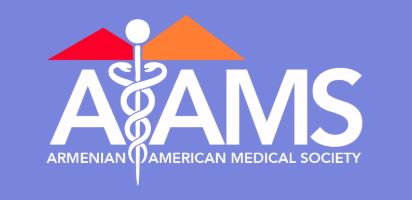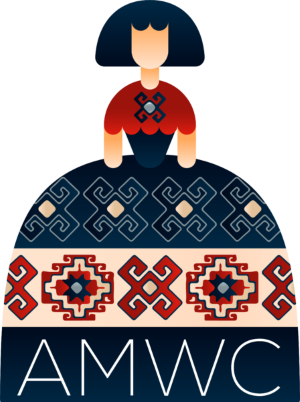 |
CME Planning document for Madrid 14th Armenian Medical World Congress
New model of Post-Graduate Medical Education and opportunities for Diaspora-Armenia Partnerships |
 |
AAMS Mission Statement:
The Armenian American Medical Society is an organization of medical professionals of Armenian descent. We are committed to delivering humanitarian aid in Armenia and across the Diaspora, mentoring healthcare professionals, and serving the Armenian community through education, outreach and professional development.
AMWC2025 Mission
"Our mission at AMWC 2025 is to foster meaningful connections and collaboration between Armenian health professionals and international experts to drive tangible improvements in healthcare for Armenia. Through knowledge exchange, networking, and scientific discourse, we aim to translate cutting-edge medical insights into actionable strategies that enhance healthcare outcomes. By bringing together professionals from both the public and private sectors, we seek to create lasting partnerships and contribute to the sustainable development of Armenia's healthcare system, while also strengthening the global Armenian medical community."
Session: New model of Post-Graduate Medical Education and opportunities for Diaspora-Armenia Partnerships
| Educational Planning and Evaluation | |
| Educational Needs |
The provider incorporates into CME activities the educational needs (knowledge, competence, or performance) that underlie the professional practice gaps of their own learners. (formerly Criterion 2)
|
|
Practice gap: Medical education in Armenia faces some challenges. A major challenge is that large amounts of medical graduates are produced with limited patient care during training. Postgraduate medical training also faces similar challenges. In many cases, residents are expected to pay for the residency, and patient contact is again limited.
Part 1 of this session presents the Pediatric Residency Program of Armenia (PReP), a collaborative initiative focused on resident training and faculty development in a competency-based education framework. The session combines structured presentation with the lived experiences of residents and faculty, offering a dynamic format that highlights both program design and real-world impact. Unlike traditional sessions, it integrates storytelling from residents, a program overview by the Program Director, and a short video of faculty and residents sharing their perspectives. The goal is to introduce participants to the core principles of PReP while emphasizing the challenges and strategies involved in implementing competency-based training. This format provides a unique and holistic view of the program that does not align neatly with existing session categories, as it blends narrative, audiovisual elements, and academic content in a single, cohesive experience.
Part 2 of this session will focus on overall health education stressing leadership skills and a competency-based program developed between HENAR and Boston University Chobanian & Avedisian School of Medicine (BUCASM). Health professions education (HPE) programs drive systemic change in healthcare workforce, specifically for providers leading post-graduate medical education (PGME). PGME is the foundation of quality clinical practice and helps health systems achieve universal health coverage and global standards of care. An education system exposed to the rigors of competency-based reform, a central tenet of HPE, produces educators and ultimately doctors with experience and standards of excellence. This session will demonstrate how an HPE program fills gaps in PGME and practice, highlighting evidence from a diverse global health research space and impact on national health outcomes.
|
|
| Designed to Change |
The provider generates activities/educational interventions that are designed to change competence, performance, or patient outcomes as described in its mission statement. (formerly Criterion 3)
|
|
Objectives: PART 1 PReP: The goal is to introduce participants to the core principles of PReP while emphasizing the challenges and strategies involved in implementing competency-based training.
PReP is making a transformative impact on medical education in the country by introducing a structured, competency-based training model tailored to local realities. It is reshaping how future pediatricians are trained, ensuring they meet defined competencies while receiving ongoing mentorship and assessment. The program is also pioneering faculty development in a context where structured teaching roles have traditionally been limited. By elevating the role of educators and aligning training with international standards, PReP is building capacity within Armenia’s healthcare system and creating a sustainable model for workforce development. The program not only improves the skills and competencies of pediatric residents, but also fosters a culture of reflective teaching and continuous improvement among faculty. This session highlights how localized educational reform can strengthen clinical care delivery and professional identity in low- and middle-resource settings.
PART 2 MODEL FOR MED EDUCATION:
The goals of this session are to introduce HPE as a concept, to illustrate its role in PGME and health systems, and to foster dialogue about its role in Armenia. The session will introduce theory, design, and the supporting evidence of an HPE program. Attendees will discuss how PGME can benefit from an HPE program. Additionally, attendees will discuss the large-scale impact HPE will have on Armenia’s healthcare system as it moves towards UHC. The session will conclude with open discussion of how such a program can be fully realized in Armenia.
|
|
| Appropriate Formats |
The provider chooses educational formats for activities/interventions that are appropriate for the setting, objectives, and desired results of the activity. (formerly Criterion 5)
|
|
Format: PART 1: PEDIATRIC RESIDENCY PROGRAM OF ARMENIA Speakers: PReP
The speakers will present a new Pediatric Residency Program of Armenia (PReP), piloted with Hinistries of Health and Education, YSMU and NIH since 2023. PReP is a collaborative initiative focused on resident training and faculty development in a competency-based education framework. The session combines structured presentation with the lived experiences of residents and faculty, offering a dynamic format that highlights both program design and real-world impact. Unlike traditional sessions, it integrates storytelling from residents, a program overview by the Program Director, and a short video of faculty and residents sharing their perspectives. The goal is to introduce participants to the core principles of PReP while emphasizing the challenges and strategies involved in implementing competency-based training. This format provides a unique and holistic view of the program that does not align neatly with existing session categories, as it blends narrative, audiovisual elements, and academic content in a single, cohesive experience.
This session offers a distinctive format that moves beyond traditional presentations by elevating resident and faculty perspectives as the primary narrators of the program’s evolution. By incorporating live reflections from residents and a video featuring faculty voices, the session provides an unfiltered, personal view into the realities of implementing a competency-based pediatric residency in Armenia. This approach is designed to spark meaningful discussion and engage the audience in a more immersive and relatable way. The session’s structure reflects the very principles the program promotes—shared learning, reflective practice, and authentic engagement.
PART 2: Health Professions Education: opportunities for Diaspora-Armenia partnership
Following the Pediatric Residency session, we have a workshop/roundtable, named “Post-graduate medical education: opportunities for Diaspora-Armenia partnership” (July 5, 11:15-13:00). We propose to renaming it to “Health Professions Education: opportunities for Diaspora-Armenia partnership”.
The HPE session will highlight the gaps and needs within the PGME space. HPE programs drive systemic improvements in healthcare by addressing workforce supply and care quality through data-driven strategies. PGME is the foundation of quality and clinical practice within a healthcare system and has been a valuable tool in helping other nations achieve universal health coverage and global standards of care. An education system exposed to the rigors of competency based reform produces educators and ultimately doctors who have learned in a PGME system that emphasizes experience and competency. With this emphasis, session will connect how an HPE program bridges the gap between education and practice, highlighting evidence from a diverse global health research space centered on HPE, extrapolating impact to national health outcomes.
Speakers:
Session outline:
1. Introduction to Health Professions Education (10 min)
2. Experiences in HPE (10 min)
3. HPE in Armenia (20 min)
4. Roundtable discussion (35 min)
5. Conclusion and next steps (15 min)
|
|
| Competencies |
The provider develops activities/educational interventions in the context of desirable physician attributes (competencies). (formerly Criterion 6)
|
|
Desirable physician attributes: Patient care, medical education, systems approach, interdisciplinary care
|
|
| Analyzes Change |
The provider analyzes changes in learners (competence, performance, or patient outcomes) achieved as a result of the overall program's activities/educational interventions. (formerly Criterion 11)
|
|
Anticipated results: The session aims to introduce participants to the core structure and guiding principles of the Pediatric Residency Program of Armenia (PReP), with a focus on resident training and faculty development in a competency-based framework. Through a blend of resident storytelling, program overview, and faculty reflections, the session seeks to provide a multidimensional understanding of how competency-based education is being implemented in a post-Soviet, medium-resource setting. It aims to highlight both the opportunities and challenges of introducing structured, assessment-driven training where traditional models have dominated. By elevating the voices of residents and educators, the session promotes peer learning and exchange of ideas across international audiences. Participants will leave with insights into designing and adapting residency programs in resource-constrained environments, as well as practical strategies for integrating competencies, feedback, and faculty engagement into everyday medical education.
HENAR Foundation aims at contributing to transformation of healthcare ecosystem in Armenia by creating and empowering a network of partners to deliver better value, better care, and ultimately better health for current and future generations of Armenians. The primary focus of HENAR is on transforming primary care system in Armenia, with the enhancement of talent development and digital transformation as key enablers that allows to supply healthcare system with qualified and skilled employees.
|
|
| Standards: | Dr Libaridian has disclosed that she is employed by Agenus, for her work on behalf of the Children of Armenia Fund (COAF). This session's topic is nonclinical (discussing a teaching program without specific treatment recommendations) and and is an exception to Standard 3. The discussion is wholly unrelated to the business lines and products of Agenus Inc. |